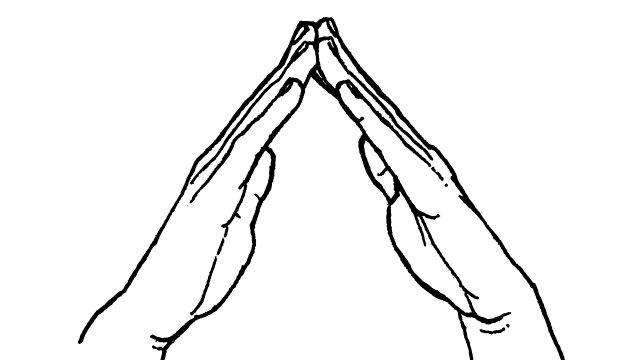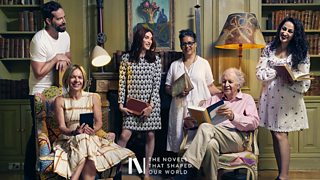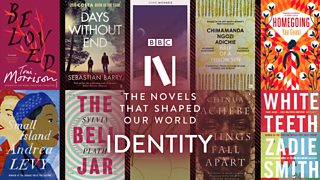
Introducing Deaf Republic
Documentary introducing Ukrainian-American author Ilya Kaminsky's new book of poetry, performed by Christopher Eccleston, Fiona Shaw, Noma Dumezweni and Arinzé Kene.
"We lived happily during the war / And when they bombed other people's houses, we / protested, / but not enough, we opposed them but not / enough".
In a departure for Book of the Week, Radio 4 presents an adaptation of Ukrainian-American author Ilya Kaminsky's new book of poetry, read by Fiona Shaw, Christopher Eccleston, Noma Dumezweni and Arinzé Kene.
Deaf Republic defies classification - it is a poetic narrative, a drama-in-verse, a contemporary epic. In an unnamed country, soldiers shoot dead a young deaf boy at a public gathering and the townspeople respond with refusal to hear the government's commands. Deafness becomes a form of protest and resistance.
This is a fable which speaks incisively about our political moment: about populations living under occupation and about governments at war with their own people. It is about our collective deafness to trauma happening elsewhere to others; and about the news we might choose not to hear. At its heart it is also a tender love story about a pregnant woman and her husband, caught up in this crisis; their love and joy set against the horror of events.
The week's programming begins with a documentary about Ilya Kaminsky, providing the backstory to this remarkable new work, more than 15 years in the making. Deaf since the age of 4, when a doctor in his native Ukraine misdiagnosed mumps as a cold, Ilya learned as a boy to closely observe the world around him. When his family fled to the USA as political refugees and settled there, he taught himself English by translating American poems back and forth between languages. We hear from Ilya and from leading authors Andrew Motion, Max Porter, Raymond Antrobus, Garth Greenwell and Carolyn Forché.
The book itself can be heard adapted across the following four episodes. The performers are Fiona Shaw (Fleabag, Killing Eve), Christopher Eccleston (The A Word, Doctor Who), Arinzé Kene (Death of a Salesman, Been So Long, The Pass) and Olivier Award-winning Noma Dumezweni (Harry Potter, Black Earth Rising).
Illustrations by Jennifer Whitten
Produced by Mair Bosworth with original sound design and music by Aaron May.
Last on
More episodes
Previous
You are at the first episode
Programme Transcript
Continuity Announcer: And now it’s time for a special edition of Book of the Week.
��
Deaf Republic is a new story-in-poems by the Ukrainian-American poet Ilya Kaminsky.Born in Odessa in 1977 – then part of the Soviet Union – Kaminsky lost most of his hearing at the age of four. His family sought political asylum in the United States in the 1990s, when he was 16.
��
Our dramatisation of Deaf Republic begins tomorrow and stars Fiona Shaw, Arinzé Kene, Christopher Ecclestone and Noma Dumezweni. But to begin the week we’re joined by some of Ilya’s admirers, including US Poet Laureate Tracy K Smith,�� poets Andrew Motion and Raymond Antrobus and novelist Max Porter, to tell us more about why this is a book worthy of our attention….��
_____________________________________________________________________________________Carolyn Forché:�� I’m Carolyn Forché and I’m an American poet.�� And when I was teaching a summer workshop, I believe it was in 1996 at the New York State Summer Writers Institute, I had them all introduce themselves around the room and normally they'll say “oh my name is John and I'm a teacher etc. etc.”. And the last person to introduce himself was a beautiful young man, very tall and he stood up to introduce himself. Everyone else was seated and he said “My name is Ilya Kaminsky, I am from Odessa, former Soviet Union. I write poetry for God,” and sat down.��
[Music/Shimmer]
Garth Greenwell: When I talk with Ilya about poetry or even when I'm just in his presence or certainly when I hear him read his poems, you really do feel like you've kind of grabbed hold of the live wire of poetry and shocks are running through your body.
Tracy K Smith: Ilya is I think one of the most magical people. There’s a sense of wonder, a sense of fearlessness.
Raymond Antrobus: There’s a saying about Ilya Kaminsky that most poets visit poetry but Ilya Kaminsky lives in poetry.
[Music/Shimmer ends]
Andrew Motion: I’m Andrew Motion and I’m sitting in London with jetlag and a hangover. [Laughs.] He looks like a certain received idea of the scruffy genius; he might equally well be a kind of maths whiz or a brilliant concert pianist or something as a brilliant poet. Six foot and something, disheveled��looking, careless of his personal appearance. He's a completely delightful person, extremely charming.
Carolyn Forché:�� I don't think I don't think there's anyone quite like him. Ilya Kaminsky has a unique voice and I think that's grounded in his unique sensibility which is not only bi-cultural and really bilingual but also bi-sensory.
[Music]
Raymond Antrobus: Hello my name is Raymond Antrobus, I’m a poet, I’m a teacher. I’ve written numerous poetry collections, my most recent being The Perseverance. I was looking for other deaf poets or poets who wrote about deafness and Ilya Kaminsky kept coming up, so I knew this was a poet I wanted to watch. And Ilya…. (laughs)….. how can I describe an Ilya Kaminsky reading? It’s like no other reading…. Ilya doesn’t necessarily read his poems, he sings them. There’s a tone… it feels like an otherworldly experience.
[Music]
Ilya Kaminsky (performing one of the poems from Deaf Republic):
��
We lived happily during the warAnd when they bombed other people’s houses, we��
protested
but not enough, we opposed them but not��
enough. I was
in my bed, around my bed America��
was falling: invisible house by invisible house by invisible house—
I took a chair outside and watched the sun.
Raymond Antrobus (continues over poem reading): I understood what he was doing. Because of his deafness he has to vibrate. The sound that he makes has to shake. He has to feel the sound that he’s making in his body.
[Music ends]��
Garth Greenwell: My name is Garth Greenwell and I'm a novelist. I met Ilya Kaminsky more than 20 years ago now. Deaf Republic takes place in a town called Vasenka in an unidentified country that resembles countries of the former Soviet Bloc. The town is invaded by a military force, and as an act of resistance the town's people go deaf. And deafness becomes a form of sedition.
[Excerpt of �鶹Լ�� Radio 4 dramatisation of Deaf Republic; poem read by Arinzé�� Kene with sound effects of dogs barking, droning music and sinister rumbling]��
…it is morning. Soldiers step back into the square.
The townspeople lock arms to form a circle and another circle around that
circle and another circle to keep the soldiers from the boy’s body.
We watch Sonya stand … Someone has
given her a sign, which she holds high above her head: THE PEOPLE ARE DEAF.
Garth Greenwell: And against this backdrop of conflict, we have three central characters. Who are Alfonso. Sonya and their child. And the story of the book is how this family survives as war wages around them.��
[Excerpt of �鶹Լ�� Radio 4 dramatisation of Deaf Republic; poem read by Christopher Eccleston with dreamy, gentle music beneath]��
������������������������������ Before the War, We Made a Child
I kissed a woman
whose freckles
arouse the neighbors.
She had a mole on her shoulder
which she displayed
like a medal for bravery.
Her trembling lips
meant come to bed.
Her hair waterfalling in the middle
of the conversation meant
come to bed.
I walked in my barbershop of thoughts.
Yes, I thieved her off to bed on the chair
of my hairy arms—
but parted lips
meant bite my parted lips.
Lying under the cool
sheets. Sonya!
The things we did.
Max Porter: My name’s Max Porter and I’m a writer. I wrote a book called Grief is the Thing with Feathers and a book called Lanny. I genuinely consider the publication of this book to be an event for us all. It’s a book about the idea of ourselves and ‘an other’ and what a dangerous idea that is. And it’s a book about war over there, and war over here, and the difference between those things.��
Yes it’s a collection of poems, yes it’s a play, but it’s more like a fable, more like a parable. But then it’s not overdetermined or cute, and it avoids the cutesiness of many fables, or versions, or remixes of myth and has this kind of startlingly political freshness. More like an essay, more like a piece of journalism.��
Ilya Kaminsky: Hello I’m Ilya Kaminsky and I’m the author of Deaf Republic. I was born in a country that no longer exists – Soviet Union. I was born in 1977 it was the time of Brezhnev. And when I was four I lost much of my hearing, so much of my childhood was - in a way - seen through images not through sounds. When I came to US 16 years later, in 1993, I realised that the language that I wanted to write in was the language of images.��
Deaf Republic is a fable, it's a fairy tale. It's both about Ukraine - which is now at war, which has been occupied - and it is also about the United States, which is at war on its own people, and on the rest of the planet. I lived for many years in San Diego, California, only about 8 miles from the border, so seeing people being put on the bus by force and arrested was a daily activity in California.����
Tracy K Smith: I’m Tracy K Smith. I’m a poet and professor at Princeton University. When I’m trying to locate the place and time of this book it slides around because I envision the people as resembling people from another era but the conflict feels very current. The first poem in the book ‘We Lived Happily During the War’ feels like a poem that speaks so much to contemporary America to me and the fact that it’s possible to live a life of great comfort and ease even during a time when war is being waged in your name and against people who look a lot like you. I think the book is very eerie in that regard because it’s saying ‘this is something that both is incredibly real but it’s also mythic’.��
Andrew Motion: One of the complicated things about the poem, in a good sense, is that it makes us think about how silence can be both a dignified retreat from joining in with barbaric actions (and a repudiation of them) but at the same time it can be - perniciously - the place to go and hide in, a place where you don't speak up in order to expose bad things that are happening.��
Tracy K Smith: In the case of this book I think it’s a wilful deafness. As on one hand an act of resistance to authoritarianism, and in the case of the world that this book offers, refusing to accept means outright saying ‘I cannot hear you’. The fact that the players here are thinking about what language invites and blocks out, and reminding us that that’s not always the whole story, that seems crucial, in a time when we’re talking about what it and isn’t fact, when the logic of language seems to not quite be enough to outweigh the chaos of injustice.��
Ilya Kaminsky: Deafness as a protest is something I’m very interested in simply because I am interested in the disabled body getting out of the hospital into the realm of political minority. The question of disability to my mind is very much a question of human rights.��
Garth Greenwell: I think I first saw a version of what would become Deaf Republic right around when Ilya published his first book Dancing in Odessa which was I think in 2004, so that's 15 years ago. And I remember he showed me this group of poems that I think at that time he was thinking of as a finished book and he was going to send it to his publisher. And I remember we had a kind of difficult email exchange because I felt that it wasn't a finished book and there were these poems that were full of beautiful lines and beautiful images but they didn't make sense as a story. They didn't cohere. And I remember asking him to wait a year before he sent it in to his editor. And then that year became five years, 10 years, 15 years finally. And of course I was just one of his readers. So he was also sending it to other poets and asking their advice and there sort of developed this kind of myth around this book that Ilya was working on. And finally really it was just in the last few years, like in 2016, this book that had remained really a kind of group of very gorgeous lyric poems became a novel, became something with the kind of sweep and narrative force that I think Ilya was always looking for.��
Ilya Kaminsky: It seems like our times are very difficult, and this story is difficult. And I hope it doesn't just represent the pain that people feel. There’s got to be some joy in the world no matter what the circumstances are. Because otherwise we lose ourselves. There is a movement in poetry called poetry of witness – witness to suffering, witness to war. It also means witnessing the tenderness, the joys of life. If you just witness the death, what kind of witness you are... you're living just 50% of the life on earth – there are also wonderful moments.��
[Music]��
Carolyn Forché: Ilya is a joyful person. He's always reminding us ‘We live on the third rock from the sun and we have this beautiful life’. He's always pointing out the mystery and beauty of everything that's around us.
Garth Greenwell: It's this kind of timeless mythic story which is finally about how does one live in a world at war. And what's very moving about it is that even though it is a book in which terrible things happen and in which people are subjected to atrocity. It is also a book that is committed to love and to hope and to a kind of indomitable faith which I think Ilya has that there is something in the human that no totalitarian regime can finally repress.��
[Music ends]
��
[ENDS]
Broadcasts
- Mon 17 Jun 2019 09:45�鶹Լ�� Radio 4 FM
- Tue 18 Jun 2019 00:30�鶹Լ�� Radio 4
Opening Lines
Sample our books and authors Clip Collection
Interviews, previews and reviews
Subscribe to the Short stories podcast
Featuring the best stories from the UK's finest writers
How many of these 100 Novels have you read?
�鶹Լ�� Arts: Books
Celebrating reading and the 100 novels that have shaped our world.




